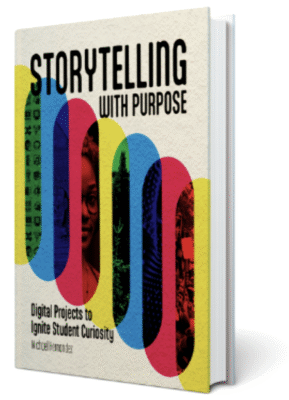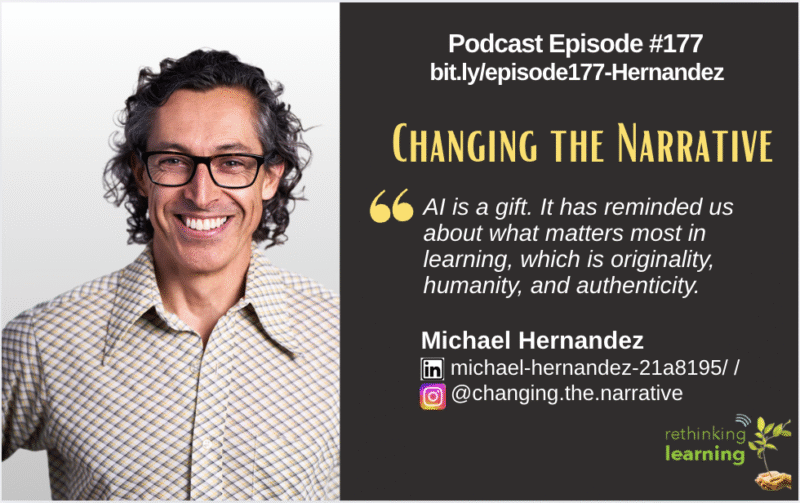
Podcast: Play in new window | Download
Subscribe: Spotify | TuneIn | RSS
Michael Hernandez is changing the narrative as an award-winning educator, best-selling author, education consultant, and international speaker. He helps individuals and organizations adapt and thrive in a changing world. Michael is an Apple Distinguished Educator, PBS Digital Innovator, and National Geographic Grosvenor Teacher Fellow. Michael’s work focuses on authentic learning in the age of AI, digital and civic literacy, creativity, and innovation.
Your WHY about Changing the Narrative
This is a challenging moment in education. I’m doing my best to help teachers and education leaders navigate these challenges. Educators diagnose problems, such as academic integrity, in the age of AI. However, kids aren’t showing up to school, physically or intellectually. There has been too much focus on standardized test scores, the drill and kill mindset, and data-driven processes. Instead, we need to focus on human-centered experiences. But I don’t see many people offering solutions. That’s where I’ve decided to focus my energy.
Students can create nonfiction multimedia research projects as an alternative to tests and worksheets. It just builds on what teachers already do best and what they know to be good pedagogy. When students have agency, when they can work on projects they care about, and when all of the hard work we ask them to do has a point, they’ll put in the effort and get excited about learning.
They won’t want to cheat if the experience is rewarding and has an impact. Even kids as young as kindergarteners can have agency and impact their communities beyond the classroom.
My WHY is to help educators design assignments that maintain rigor and address standards, but in ways that are meaningful to students and help teachers make the case for why their curriculum matters.
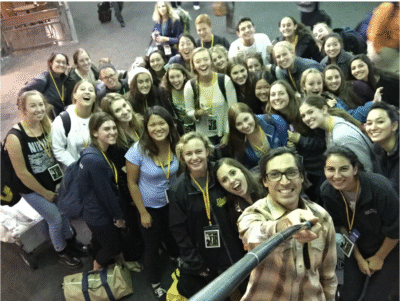
How Changing the Narrative Affected You Growing Up
I come from a family of educators–both of my parents, two aunts, and my uncle were educators. My brother is a college professor and research scientist. I guess learning is in my blood. I grew up in Central California, the son of a migrant farm worker who was the first in his family to graduate from college, so I have the experience of understanding why a quality education is important. I was fortunate to have some incredible teachers growing up, from elementary through college, who shaped who I am and my teaching philosophy. In fact, many of them are in the acknowledgements section of my book. The main thread is that they were all creative and none of them stuck to the rules.
Even though they asked us to work hard, we had fun, and school was joyful. Fun and joy are the key pieces that have been sucked out of education in the U.S. ever since No Child Left Behind. The metric of success became a test score, not a tangible product or observable outcome. It’s not surprising that student engagement has been decreasing for years, long before the pandemic and cell phones.
Your Story of Changing the Narrative as an Educator
As I said, both of my parents were educators, so I should have known better than to become one! I was finishing graduate school in film and realized that I had student loan debt. I was going to be a production assistant, hunting for jobs. I should have thought that career path through a little better!
Then I heard about a school district starting a film and journalism program, so I applied, and they hired me. It was a 5-year plan to pay off my student loans. I foolishly thought I could work on my own projects in all the spare time that teachers have!
I just completed year 26 of the five-year plan! I was able to share my passion for film, journalism, and storytelling with thousands of students–many of whom are working in the industry. It’s so rewarding to open eyes to new possibilities, and students found their “thing.” It wasn’t math, or history, or science. We can’t all be novelists or engineers. It’s crucial to honor everyone’s individuality and potential, and offer students experiences that empower them to discover their way.
Now that I’ve left the classroom, I’m focusing on helping schools and districts adapt and thrive in these challenging times by taking my knowledge of teaching and deep empathy for teachers to help others find success in meaningful ways. I support schools through keynote speaking, leading professional development experiences, and working alongside leadership teams. I’m still a teacher; however, I get to have more impact than if I stayed in my own classroom.
Book: Storytelling with Purpose: Digital Projects To Ignite Student Curiosity
I published my book, “Storytelling with Purpose, through ISTE (International Society for Technology in Education). It is a practical handbook and guide to solving these problems by designing authentic learning experiences.
This has been my passion project for the past few years. I wanted to write a book that I wish I had when I started teaching or even mid-career. The title might be a little deceiving. Many educators don’t think they teach storytelling, especially if they teach math, history, or science. We always ask students to tell the story of their learning. We even say “show what you know” or “show your work,” and that’s exactly what the book helps teachers in every grade level and subject area accomplish.
We demonstrate how to use multimedia research projects as a scaffold for their curriculum. So instead of a worksheet, a test, or a report that all end up in the trash and are cheatable by design, we challenge students to create an explainer video, publish a digital book, or an infographic. All of these are one-of-a-kind products that let students have agency and voice, and can be published publicly, which empowers both impact and accountability.
Link to Storytelling with Purpose: https://www.amazon.com/Storytelling-Purpose-Digital-Projects-Curiosity/dp/1564849961/
It was important to me to make my book evergreen. There are many books about AI and specific tech tools, but I wanted this book to be device-agnostic and about pedagogy rather than a single tool. Apps come and go, but good teaching is forever.
A highly readable and hugely helpful guide for teachers!” ~ Ken Burns
Many teachers around the world are using it for professional development training. I recently led a five-hour pre-conference workshop at ISTE/ASCD this summer with teachers from at least 10 different countries. I am fortunate to have endorsements for my book from Ken Burns and Seth Godin.
Just in time! This is a pedagogical and practical guide for teachers ready to take learning to a new level. ~Seth Godin
Consultant and International Speaker on Changing the Narrative
I enjoy working with educators, learning from them, and sharing possibilities to spark new ideas in their learning spaces. I used to focus on edtech tools since that’s where I got my start speaking at CUE (now CALIE) and ISTE. I’ve expanded my workshops into areas like assessment, digital and civic literacy, innovative teaching, and learning practices.
I think that matches the evolution of technology, that it’s integrated into our lives. It seems almost artificial to focus on it in a silo, and out of the context of everything else we need to do in schools. Social-emotional wellness, assessment, inquiry, curiosity, creativity, and all of these are tied to our relationship with technology and how we as educators prepare students to be successful outside the classroom, not just on a test.
One of the central ideas in my consulting work and writing is about reminding ourselves what school is for in the first place: to develop good citizens. No one takes tests or writes 5-paragraph essays. When our students are out in the world, when no one is looking, and there’s no grade on the line, can they vet a source of information so they know how to vote or what medicine to take?
Are they capable of giving and receiving constructive feedback?
These are the traits of good citizens in a democracy. It’s up to us as educators to help our students become intellectually agile and emotionally resilient. We can’t do that with tests and worksheets.
Your Podcast: Change the Narrative
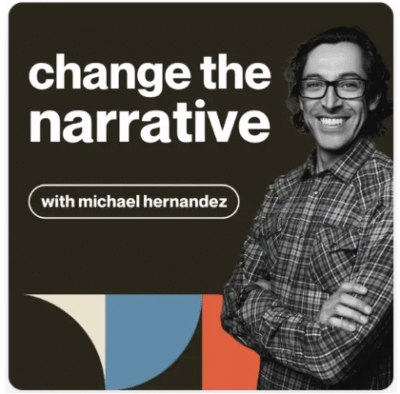 This is a funny story. When I chose the idea for my book, I started researching how to publish it. One of the recommendations was to build an audience before you publish. So I started publishing my newsletter in 2018. A friend liked it a lot and suggested that I turn it into a podcast.
This is a funny story. When I chose the idea for my book, I started researching how to publish it. One of the recommendations was to build an audience before you publish. So I started publishing my newsletter in 2018. A friend liked it a lot and suggested that I turn it into a podcast.
So I did! Then, two years later, I finally got around to working on the book. But it’s a fun series. I average one season per year, and the topics change depending on what interests me. The topics are like innovation, storytelling, book publishing, and reflections on my expedition to Antarctica as a Lindblad/National Geographic Grosvenor Teacher Fellow. I haven’t decided on my theme for 2026, so I’m open to any suggestions!
Podcast, Change the Narrative:
https://podcasts.apple.com/us/podcast/change-the-narrative/id1455984465
Fostering a Culture of Academic Integrity in the Age of AI
AI is definitely top of mind for many educators, especially anyone who relies on writing as their primary means of assessment. Honestly, this affects everyone, from math teachers to science teachers, and even me as a photography, filmmaking, and journalism teacher. Students can literally generate high-quality images, video clips, and audio podcasts with just a prompt. It’s easy to see AI as a threat to our livelihoods and feel a sense of existential dread.
What does it mean to teach and learn anymore?
I’m actually optimistic about it. I think AI is a gift. It has reminded us of what matters most in learning: originality, individuality, creativity, and having a purpose for our work. Artificial intelligence isn’t the problem; it’s artificial assessment.
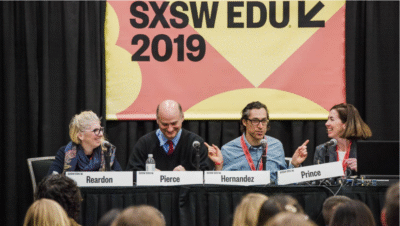
Much of school is based on teaching mechanics, and because standardized tests focus on that, we don’t teach or learn for fun or create rewarding experiences. The latest statistics show that fewer people read, and most students in school don’t even complete an entire novel in their language arts classes.
We’ve drained humanness from school.
This is why I’m excited about AI. If a tool can do the mechanical and clerical work for us, we can then focus on ideas and purpose. It’s forcing us to focus on the “why,” not just the “how.”
It’s really disheartening when I see schools revert to in-class hand-written essays or spend tens of thousands of dollars on cheat detection software that is ultimately flawed. What does that say to our kids about what we think of them? Policing students and creating an antagonistic culture is a surefire way to make kids unhappy, and they may not show up. And if they do show up, they are not putting their best effort into their work.
Cheating has always existed, long before AI, Google, and cell phones. There are two main reasons why students cheat: by incentive and by design. If we remove the incentive to cheat, we’ve solved 90% of the problem. And if our assessments only have one right answer that everyone is supposed to share at the same time, we’ve set ourselves up for failure.
Online Course: Uncheatable Assessments
In my online course, Uncheatable Assessments, I help teachers focus more on process and product rather than on memorization and compliance. And we learn to design assignments that result in original, one-of-a-kind artifacts that students want to complete
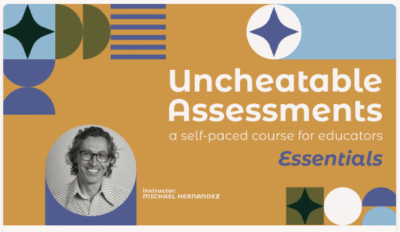 After I published my book, I heard that people were interested in the chapter on using multimedia research projects as a type of authentic assessment. There was a demand for this topic in my workshops.
After I published my book, I heard that people were interested in the chapter on using multimedia research projects as a type of authentic assessment. There was a demand for this topic in my workshops.
So, I produced an asynchronous course that was flexible for busy educators. They didn’t need to fly to a city to attend a conference, and can fit in the modules when they have time, like during a prep period or after school. There are about 4 hours of video instruction, a 75-page downloadable workbook, and there’s even an option to earn three continuing education units from Loyola Marymount University for salary advancement or required professional development. There are volume discounts for school districts to make it more feasible for educators.
Link to course, Uncheatable Assessments https://storytelling-with-purpose-learning.thinkific.com/collections/courses-for-educators
Online Course: Slidefluence
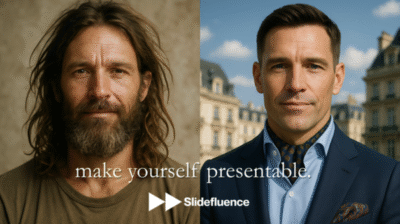 Everything is moving to video right now. Teachers have lectures recorded, and businesses engage with customers and clients on websites and social media. Just look at TikTok and Instagram. There’s really no way to learn how to do that well. I decided to create an affordable, all-in-one course to help folks learn to be effective video storytellers.
Everything is moving to video right now. Teachers have lectures recorded, and businesses engage with customers and clients on websites and social media. Just look at TikTok and Instagram. There’s really no way to learn how to do that well. I decided to create an affordable, all-in-one course to help folks learn to be effective video storytellers.
I’m really excited about it, and I’m in the middle of editing it right now. Essentially, the course will show you how to transform slide decks into dynamic videos that help you teach, persuade, and win people over. Entrepreneurs can pitch their product to funders, Businesses can create a library of content for customers, Sales teams can make the case for their results more clearly, and, of course, educators can create engaging direct instruction to help learners of all abilities and in multiple locations. I talk about finding focus for the story, writing a narration script, designing slides, and recording and publishing the videos.
Online course, Slidefluence:
https://www.michael-hernandez.net/slidefluence.html
Michael’s Contact Information
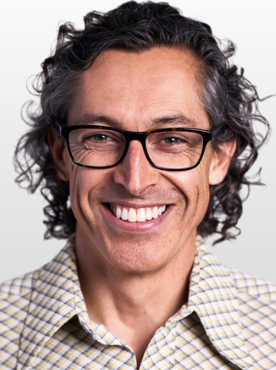 LinkedIn: https://www.linkedin.com/in/michael-hernandez-21a8195/
LinkedIn: https://www.linkedin.com/in/michael-hernandez-21a8195/
Personal Website: https://www.michael-hernandez.net/
Website: https://www.storytelling-with-purpose.com/
Instagram: @changing.the.narrative
Email: cinehead3@gmail.com
*****
I am grateful that Michael joined me on my virtual porch. I have known and followed Michael for a long time. We’re both from California, so I met him earlier at CUE and then again at SXSW EDU 2 years ago when he launched his book. It was fun to connect on Zoom and see Michael sharing how he’s so passionate about helping educators make learning meaningful and assessments uncheatable. I hope you connect and follow Michael. Please share this post and podcast with your friends.
*****
Check out more of the Rethinking Learning podcasts and the posts by each guest. Click on this link or the logo below to list by episode, alphabetical, or reflections. |
I am also the co-host of the “Real Talk” podcast with Nicole Biscotti. We delve deep into the topic “Authenticity in a Polarized Society.” Click on RealTalkBN or the logo below. |
I’m getting wonderful feedback on how much the information and stories in “Define Your Why” have helped them. For more information about this book, go to this page or click on the book for resources, questions, and links. |
My latest book, “Grow Your Why…One Story at a Time,” includes 23 stories from inspirational educators, innovators, and entrepreneurs. Go to this page or click on the book to go to Why Press Publishing for launching, details, and resources. |

